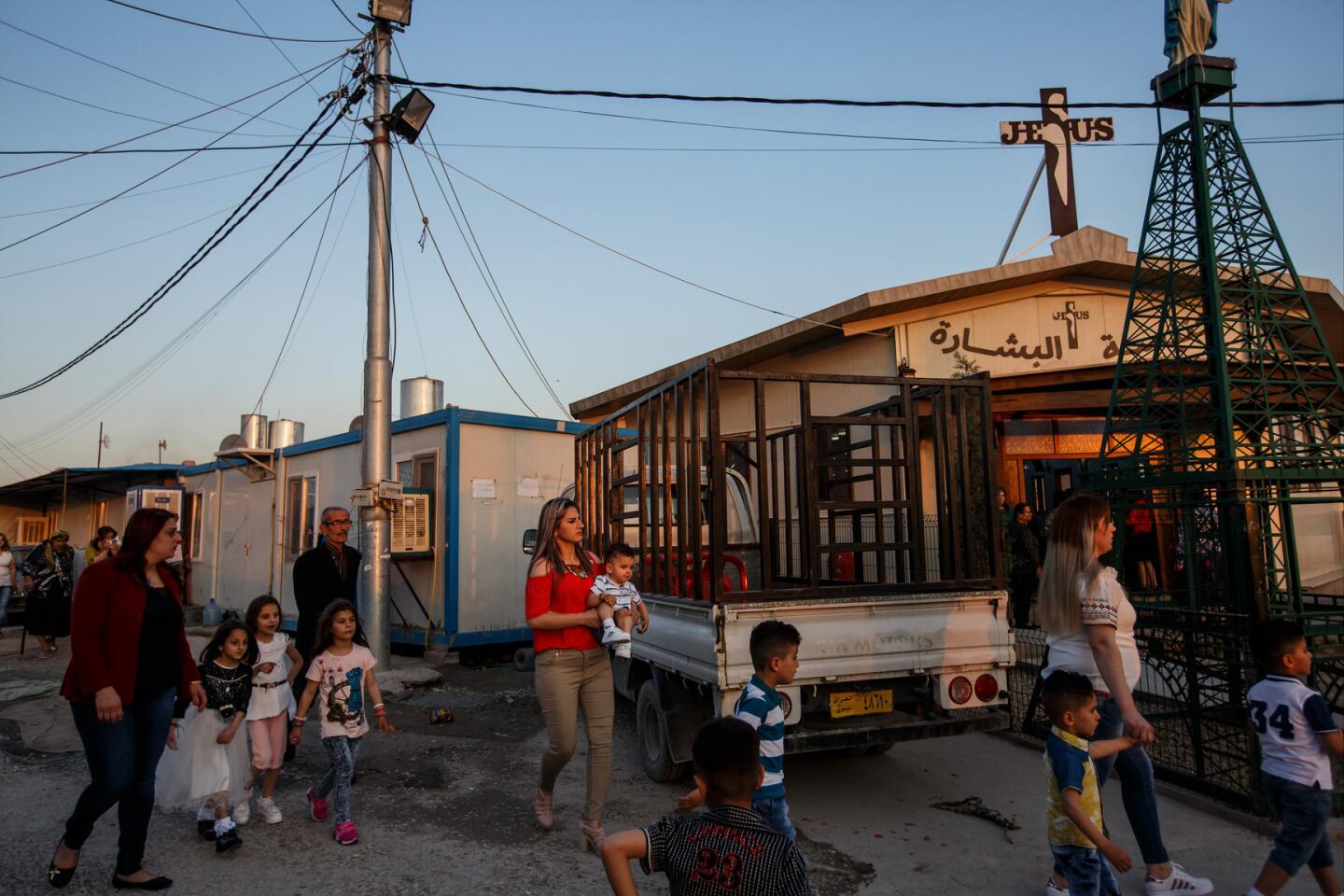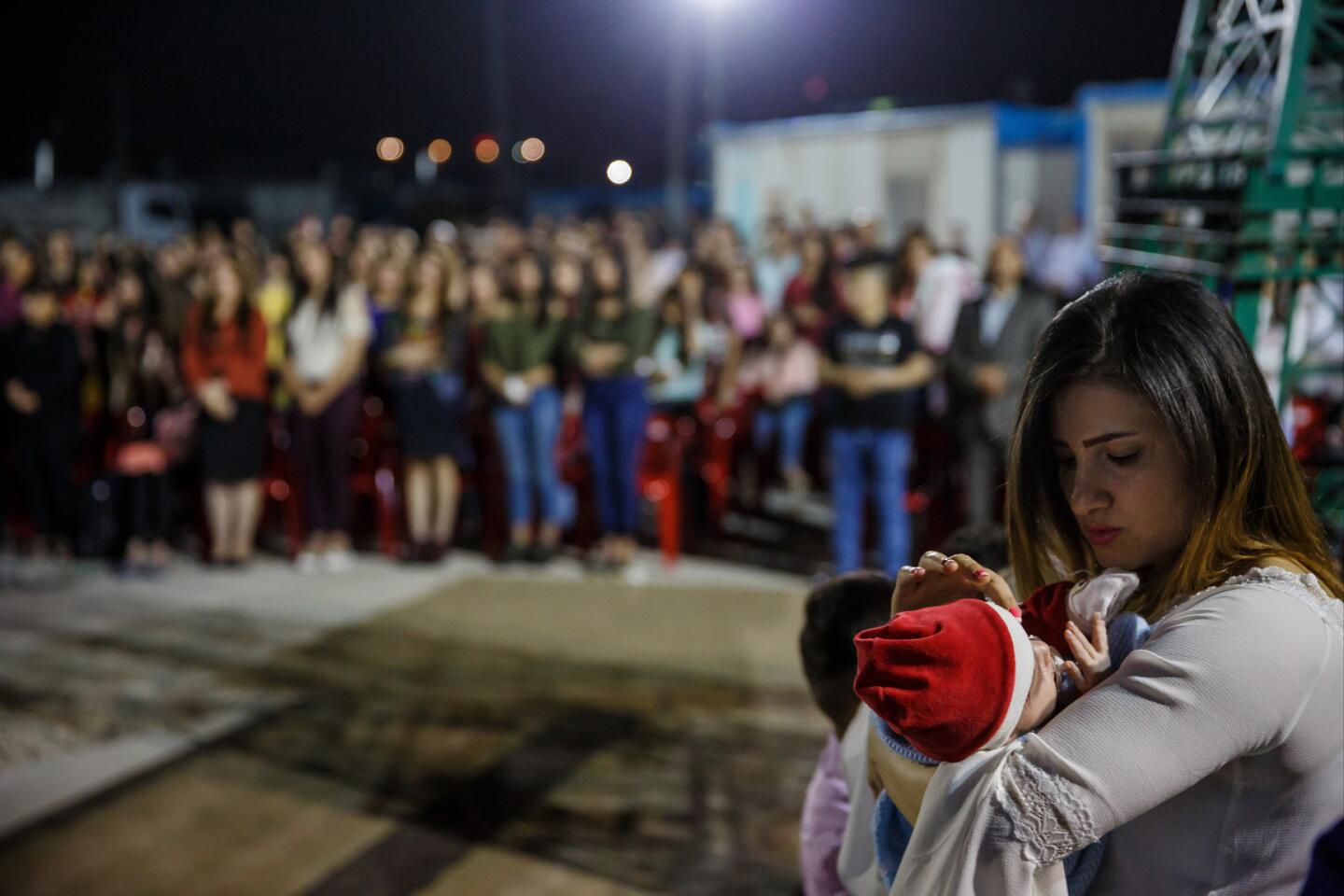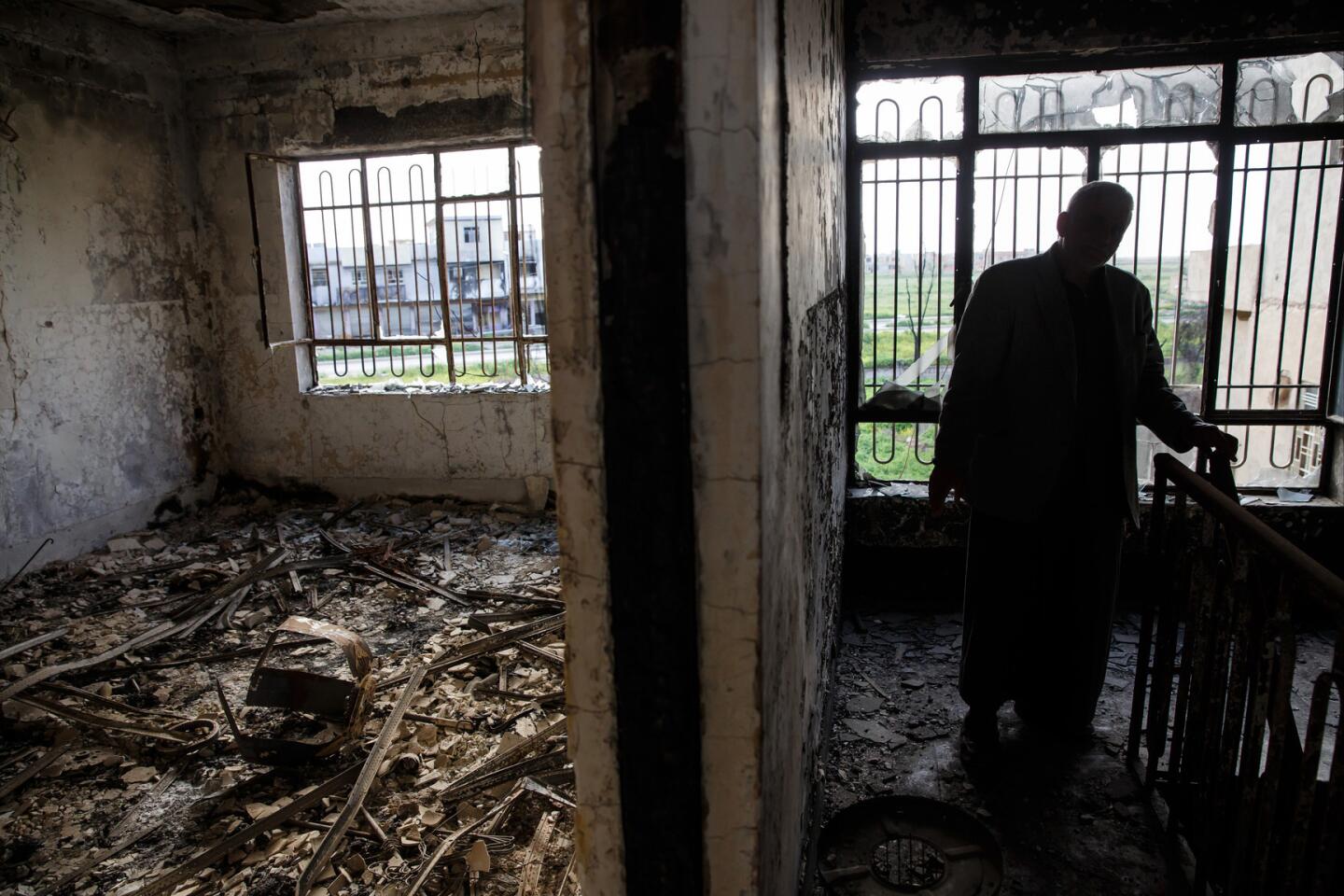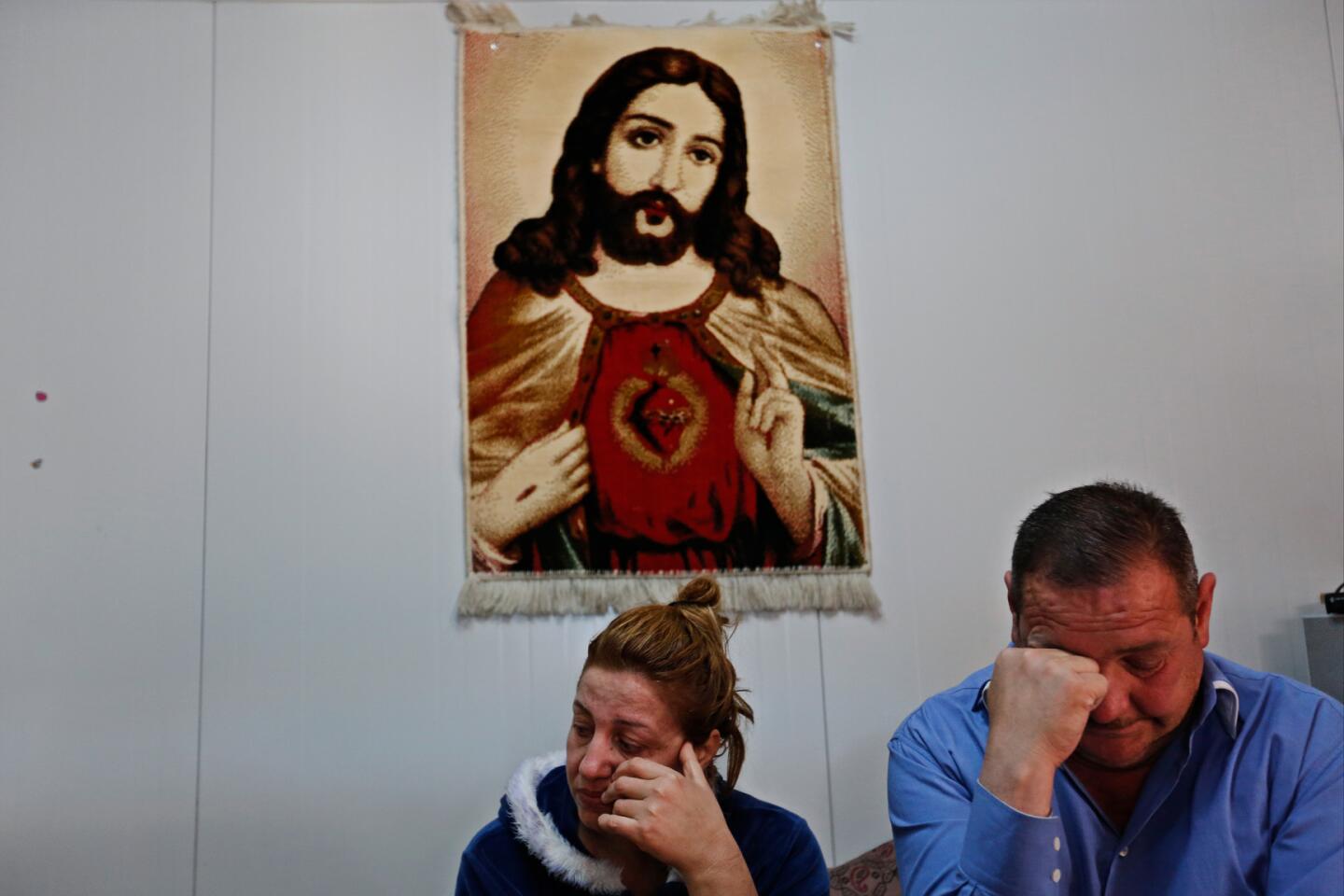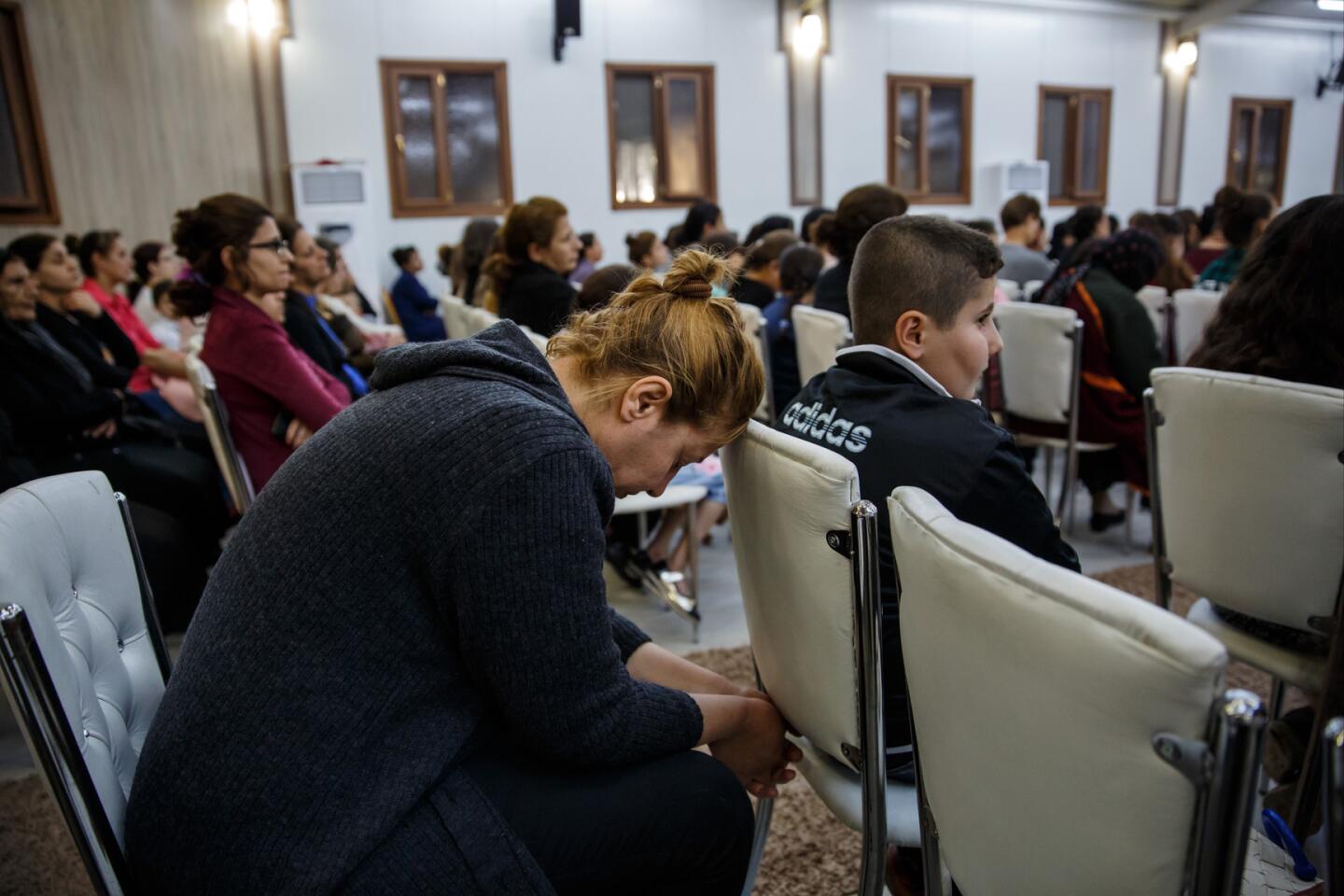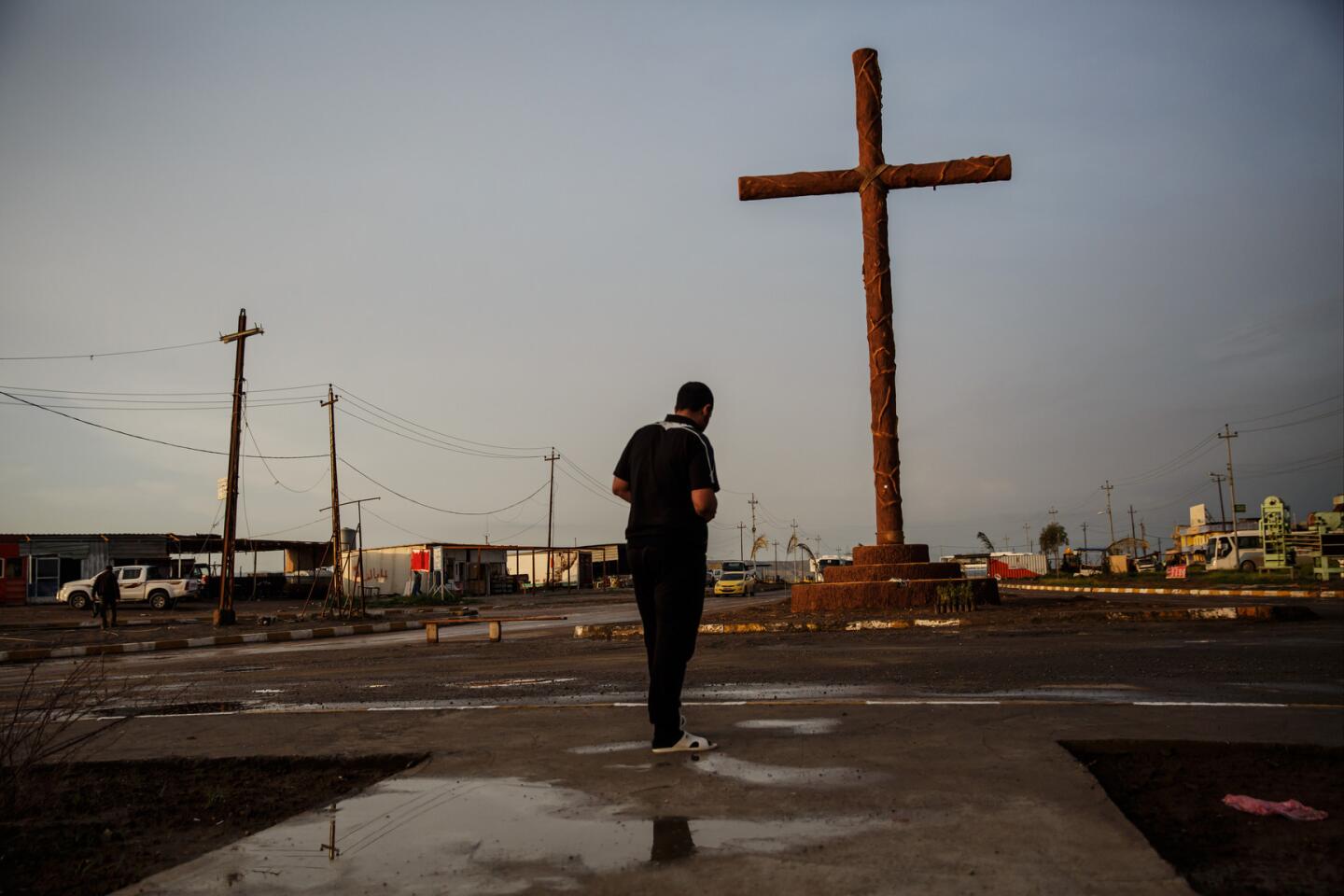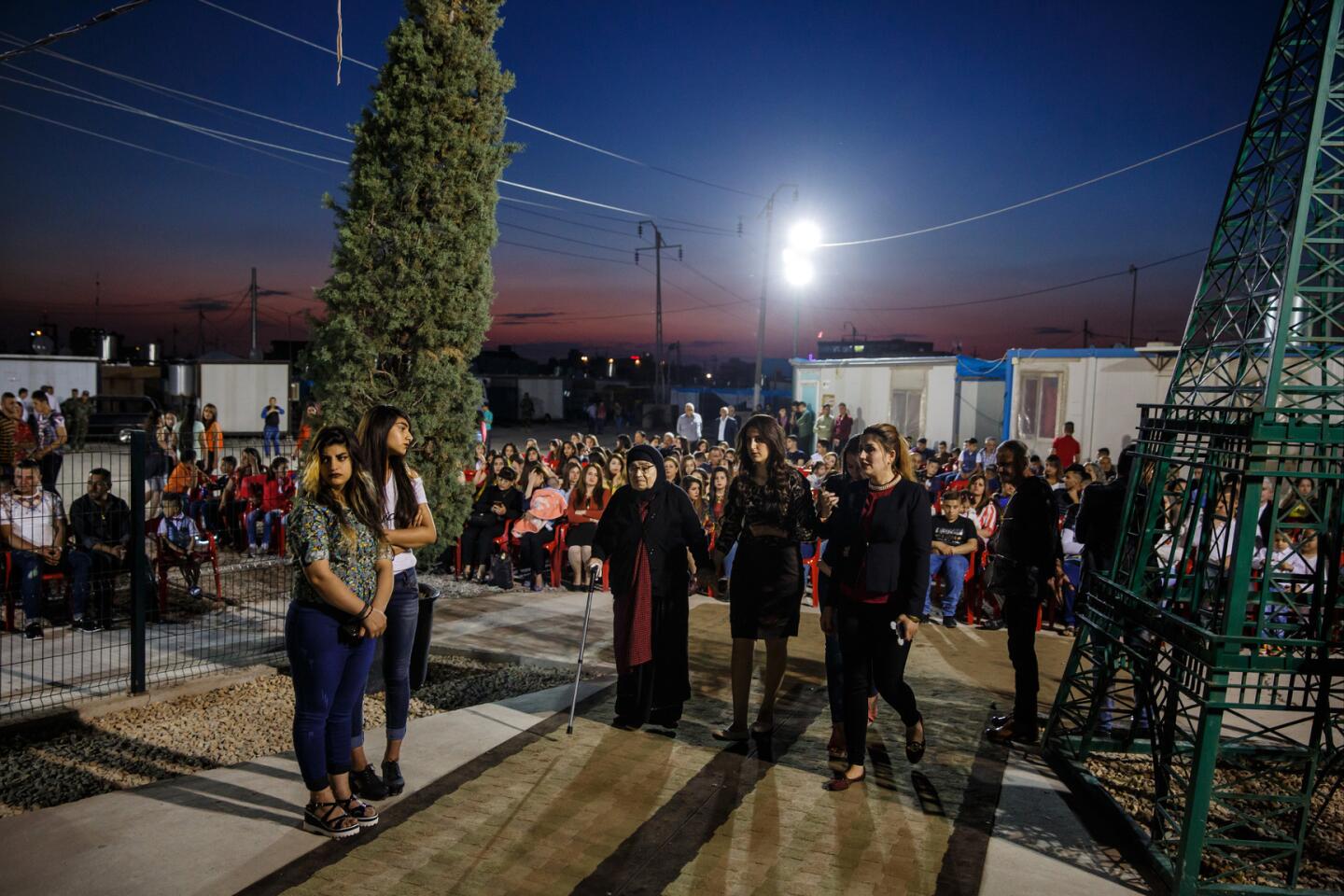Amid reminders of bloodshed and oppression across the Middle East, beleaguered Christians celebrate Easter

Christians have long been an embattled minority in Egypt, 10% of the overwhelmingly Sunni Muslim population of more than 92 million.
- Share via
Reporting from Cairo — On the eve of Christianity’s holiest day, Coptic Christian families filed past armed guards and a metal detector to the chapel beside St. Mark’s Cathedral, where 29 of their loved ones were killed by an Islamic State suicide bomb attack before Christmas. The marble columns still bear large pockmarks gouged out by the explosion.
A week earlier, Islamic State bombers killed 45 people gathered for Palm Sunday at churches to the north in Alexandria and Tanta.
“Death is not far from us,” said Sandra Joseph, 22, a student at local Ain Shams University who helped usher several hundred people in for the service at the Chapel of St. Peter and Paul. “We got used to explosions.”
As they had waited to enter the cathedral’s walled church complex — on edge after the attacks and fatigued by 55 days of fasting for Lent — some worshipers worried aloud about a possible drive-by shooting. Once inside, they felt a bit safer.
Holy Week, which culminates with the celebration of Easter Sunday, recalls Jesus Christ’s rejection and journey down the via dolorosa, the sorrowful road, on the way to crucifixion. Across the Middle East this Easter season, Christians are traversing their own difficult path, gathering to worship even as they are attacked and displaced by Muslim extremists.
In Iraq, Christian villages outside Mosul freed from militants remain abandoned, residents unwilling to return for fear they will be killed. In Syria and Jordan, armed guards patrol outside churches where pews sit empty as fearful worshipers stay home. And in Egypt, Coptic Christians face a campaign by Islamic State to attack and displace them on the eve of a visit by Pope Francis on April 28-29 to mend ties with Muslim leaders.
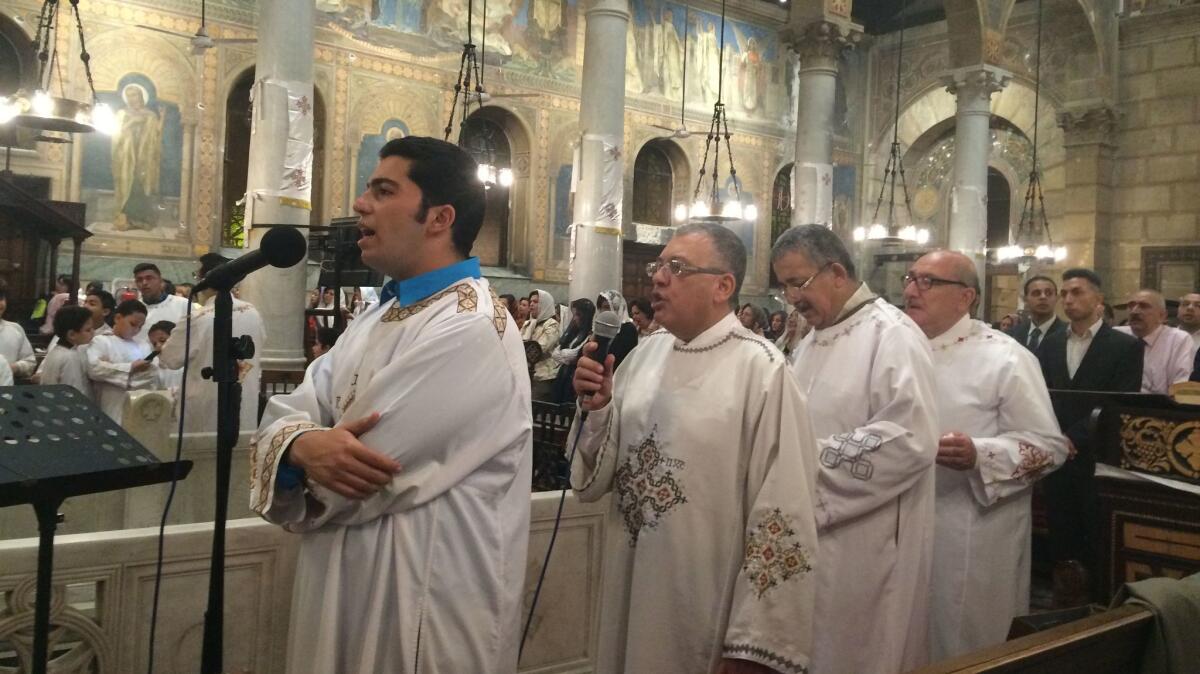
Christians have long been a beleaguered minority in Egypt, 10% of the overwhelmingly Sunni Muslim population of more than 92 million. Last Monday, militants fired a rocket at an Israeli border crossing in the northern Sinai region, where they have been battling both security forces and Christian civilians. Seven Christians were killed in February and hundreds displaced.
But the attacks have spread beyond Sinai. There were reports of Christians attacked by a mob during Maundy, or Holy, Thursday prayers in the southern city of Minya, home to the largest Christian population in the country and a tinderbox of sectarian violence.
Explosions in churches here are a fresh horror. A week before the Tanta church was bombed, authorities had found and diffused another explosive at the church. On Wednesday, St. Michael’s Church in Cairo was evacuated after three bombs were discovered inside. The same day, Egyptian authorities claimed to have foiled an attack on a Coptic monastery to the south in Assiut.
But the attacks seem to have galvanized, rather than scared off, many of Egypt’s Christians. About 3,000 people filled St. Mark’s Cathedral and the adjoining chapel on Saturday for the service known as the Great Vigil. Church regulars said the crowd at the chapel appeared even larger than usual, with people spilling out into the stone courtyard. They pointed out all the repairs since the December blast: New carved wooden doors, windows and shimmering lights.
In the chapel courtyard, a blood stain on a wall has been preserved under glass, and a memorial erected in honor of the victims.
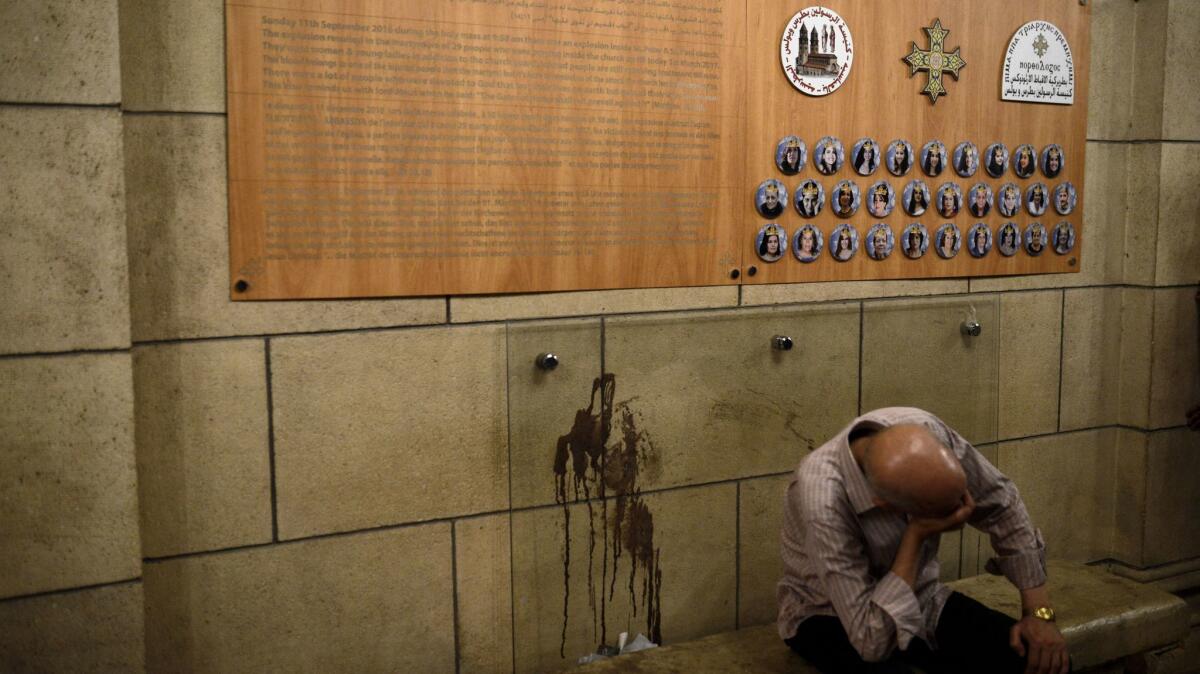
Priests processed into the chapel with a coterie of deacons in white vestments, chanting in the ancient Coptic language and holding golden crosses aloft, including one still scarred by the explosion.
Holding the damaged cross and leading the procession was Emad Tawil, 53, who survived the Dec. 11 bombing but lost his wife and 19-year-old daughter. His wife had grown up attending the Tanta church, which Tawil’s grandfather helped build.
So the day of the Palm Sunday bombing, he and his son traveled north from Cairo, unafraid, to meet and support fellow victims in Tanta. A massive funeral at the church that night drew thousands, as did the funeral the next day in Alexandria.
“Everyone was asking what we should do. We have to have faith,” said son Peter Tawil, 21, who joined his father at the front of the chapel for Easter prayers.
In the wake of the Palm Sunday bombings, President Abdel Fattah Sisi, a Muslim longtime ally of the Coptic community, declared a three-month state of emergency. Among the provisions: Legislation designed to speed trials in terrorism-related cases and the formation of a Supreme Council to Combat Terrorism and Fanaticism, which gave some Egyptians hope of added security.
Sisi also visited Coptic Pope Tawadros II in Cairo on Thursday to offer condolences, and added security outside churches across the country, including a tank and soldiers outside St. Joseph Roman Catholic Church in downtown Cairo.
Days before the bombings, Sisi had met with President Trump in Washington and promised to battle Islamic extremists. Some still worried Saturday.
“Everyone thought the bomb attacks would stop. It’s happening here and in Sinai and Minya and the police don’t do anything,” said Shanuda Roshdy, 34, who brought his 4-year-old daughter, Candy, to Holy Week services, scanning the crowd outside the chapel for possible terrorists. “We don’t trust Egypt.”
Roshdy’s mother-in-law was killed in the December attack, and his daughter still asks for her daily. He plans to immigrate to Australia or Canada to protect her.
“Every moment we are at risk,” he said.
It was a sentiment shared by many Assyrian Christians in northern Iraq, forced from their towns two years ago by Islamic State and unwilling to return now that they have been freed by Iraqi forces and the U.S.-led coalition. Tens of thousands of the displaced have moved overseas, or to temporary camps like a trailer park about 50 miles east of Mosul in Irbil.
There, Suad Rahim was making klecha holiday cookies last week with her three daughters, stuffing them with dried coconut and chopped walnuts. Chased from their Christian town of Qaraqosh two years ago by militants who burned their home and church, they were unwilling to return. Electricity and water have yet to be restored. Shops remain gutted. Only a handful of families have moved back, and the city is policed by militias. She recognized some of the officers as former Islamic State militants.
“It’s not safe,” said Rahim, 50. “We don’t know who is who.”
In the city of Homs in Syria, Christians who dared to return marched on Good Friday past bullet-riddled storefronts and bombed-out apartments. Clergymen carried a small coffin of flowers, a symbol of the death of Christ, past a coterie of soldiers and militiamen toting AK-47s, guards against suicide bombers and other attacks. Only about 50,000 of the 300,000 Christians who once filled Homs’ Old City have returned.
In Jordan, the country’s 2% Christian minority marked Holy Week with subdued celebrations. Like Egypt, Jordan is overwhelmingly Sunni, and is thought to have no lack of Islamic State supporters.
“Today the church attendance was less than usual, two-thirds of what we expected,” said Revered Canon Faeq Haddad at Amman’s Arab Evangelical church, where congregation members called to say they were too afraid to attend Good Friday services.
Haddad gestured to the outside of the church, where a gaggle of officers was stationed beside a police SUV.
“Fear is part of life, but our job is not to reinforce this feeling. You go to an airport and there’s security. Do you stop flying because of it? No. Do you stop going to church because of security posted outside? No,” he said.
He insisted that Christians were staying put, no matter the threat.
“These nations without the Christians will be ruined, because we are not just the salt of the earth that flavors, but we’re also the candle that provides light,” he said.
In Christian theology, Easter celebrates Christ’s resurrection and the promise of salvation. It is a joyous holiday, but some worshipers in Cairo wore black out of respect to those recently killed, and planned to stay home Sunday to honor them.
One worshiper at the chapel service, Vivian Aziz Shehata Shenoudah, 58, said she had prayed for those who have targeted Christians.
“We don’t need them to love us, to like us, just to leave us in peace,” she said.
She left the Mass wearing her matching gold cross necklaces but also a head scarf. It’s a habit she developed during the last year, after being harassed on the street for being Christian. She wasn’t hopeful about the state of emergency.
“We have more security now, but who knows what it will be in the future,” she said. “Terrorists are not stupid. They will find a way.”
The Great Vigil ended without incident, and though the priest did not mention the recent attacks during Mass, when it was over he urged people to leave quickly, for their own safety.
Times staff writer Patrick McDonnell contributed from Homs, Syria, and special correspondent Nabih Bulos from Amman, Jordan.
Twitter: @mollyhf
ALSO
Another journalist is gunned down in Mexico — the fourth in just six weeks
North Korea defiantly attempts another missile test, but launch ends in failure
At least 100 Syrians killed in bomb attack on evacuation bus convoy near Aleppo
More to Read
Sign up for Essential California
The most important California stories and recommendations in your inbox every morning.
You may occasionally receive promotional content from the Los Angeles Times.

